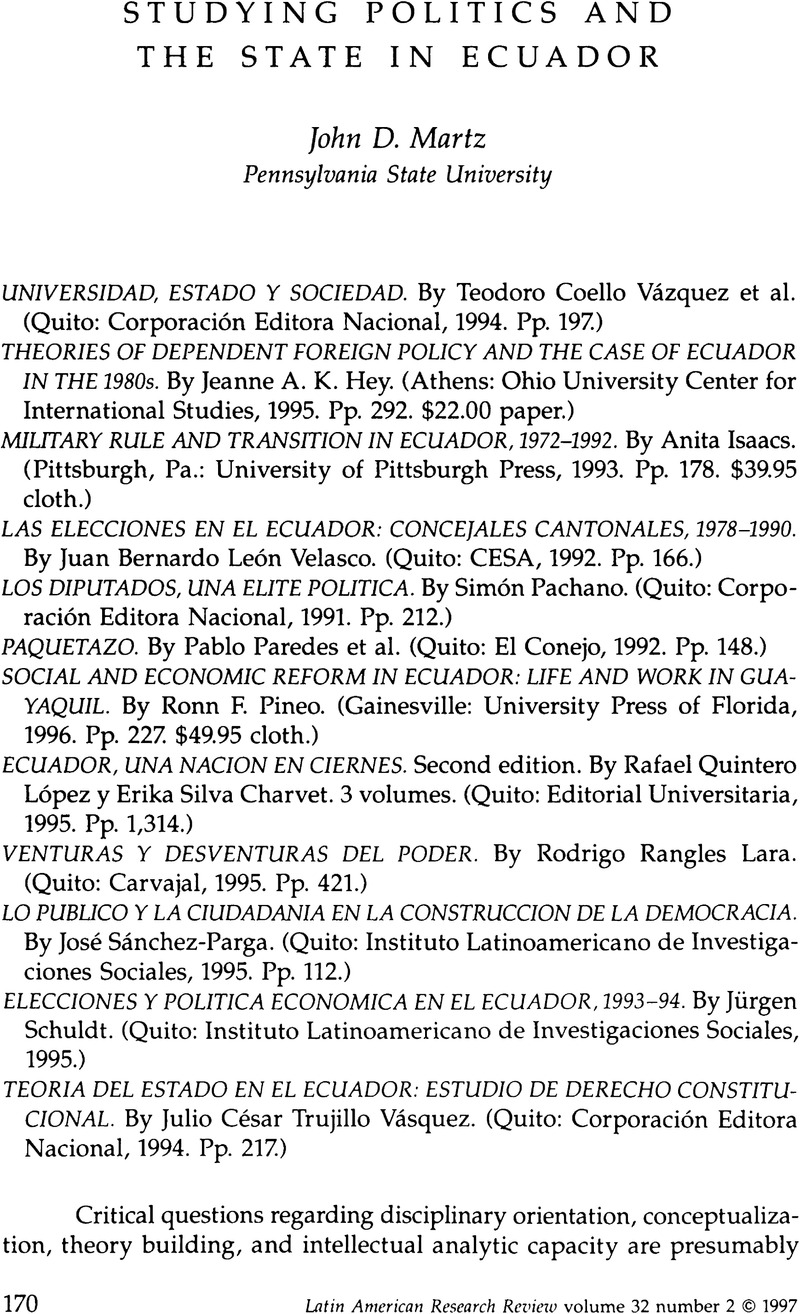No CrossRef data available.
Published online by Cambridge University Press: 05 October 2022

1. For a statement that may serve to dramatize the broad potential range of obstacles and circumstances confronting the researcher, see John D. Martz, “The Conduct of Social Research in Latin America,” Studies in Comparative International Development 24, no. 1 (Spring 1989):47–65.
2. Equally discouraging was a conversation with Ecuador's famed novelist Jorge Icaza, the author of Huasipungo (1934). Serving at that time as director of the library, he lamented from a dilapidated corner office the lack of significant support from public and private sources.
3. For details, see two reports published in LARR: Rafael Quintero López, “Escuela de Sociología y Ciencias Políticas: La política académica de la Dirección, 1974–1976,” LARR 13, no. 2 (1978):236-42; and John D. Martz, “Social Sciences Centers in Quito,” LARR 14, no. 2 (1979):208–12.
4. Each of these prizes is recognized as highly prestigious, being awarded by judges who are major intellectual and pedagogical figures. The November 1991 awarding of the Isabel Tobar prize represented the opinion of a jury composed of Ernesto Albán Gómez, Julio Echeverría, and José Sánchez-Parga. The prize awarded by the Universidad Central, granted in March 1992, reflected the judgment of Enrique Coello, Edison Egas Egas, and Guillermo Bossano.
5. The primary work is unquestionably John Samuel Fitch's The Military Coup d'Etat as a Political Process: Ecuador, 1948–1966 (Baltimore, Md.: Johns Hopkins University Press, 1977). Also of major significance is Augusto Varas and Fernando Bustamante, Fuerzas armadas y política en Ecuador (Quito: Universidad Central del Ecuador, 1978). A more recent monograph detailing the role of the armed forces in Ecuador from 1972 to 1988, including the institutional conflicts during the presidency of León Febres Cordero, is John D. Martz, The Military in Ecuador: Policies and Politics of Authoritarian Rule, LAI Occasional Paper (Albuquerque: Latin American Institute, University of New Mexico, 1988).
6. A detailed political study that stresses internal doctrinal, policy, and personalistic divisions is John D. Martz, Politics and Petroleum in Ecuador (New Brunswick, N.J.: Transaction, 1987). While it contains extended discussion of petroleum policy, what is termed “reformism versus anti-nationalism” is also traced for other areas, notably agrarian policy and politics. The broader emphasis of this study is focused on patterns of policy making articulated and implemented by military-authoritarian as well as democratic-pluralist regimes, and it thus presents a broader perspective on Ecuadorean politics.
7. Hey cites Alexander L. George, “Case Studies and Theory Development,” paper presented to the Second Annual Symposium on Information Processing in Organizations, Carnegie-Mellon University, Pittsburgh, Pa., Oct. 1982, p. 27.
8. For a nontheoretical but factual consideration of foreign policy under the subsequent administrations of Rodrigo Borja (1988-1992) and Sixto Duran Bailen (1992-1996), see the narrative by John D. Martz, “The Fate of a Small State: Ecuador in Foreign Affairs,” in Latin American Nations in World Politics, 2d ed., edited by Heraldo Muñoz and Joseph S. Tulchin (Boulder, Colo.: Westview, 1996).
9. Elected as vice-president in 1978, Hurtado became president following the death of President Jaime Roldós Aguilera in a plane crash. Hurtado predictably has remained a major figure nationally as well as inside the Democracia Popular. The party itself, however, has suffered a series of internal struggles that have affected its national standing, including the virtual marginalization of Trujillo.
10. An important resource is Elecciones y democracia en el Ecuador, 4 vols. (Quito: Tribunal Supremo Electoral-Corporación Editora Nacional, 1989–1990). Also see El Ecuador en las urnas: Lucha social, lucha política, compiled by Luis Verdesoto (Quito: El Conejo, 1984); and Ecuador 88: Elecciones, economía y estrategias, compiled bv Gaitán Villavicencio et al. (Quito: CERG-E1 Conejo, 1988).
11. To cite only a few illustrations, consider Alfredo Pinoargote, El monumento del poder (Quito: Editorial El Conejo, 1987), which examines the politics, funding, and construction of the Guayaquil highway as an example of influence-peddling. See also Febres Cordero y los derechos humanos, compiled by Francisco Enríquez Bermeo (Quito: Editorial El Conejo, 1988), which dissects human rights problems during the Febres Cordero administration as reflected by the interpellation of Minister of Government Luis Robles Plaza. Finally, see Gaitán Villavicencio et al., Ecuador 88: elecciones, economía y estrategias, which considers the politico-economic scene when power was transferred from Febres Cordero to Rodrigo Borja.